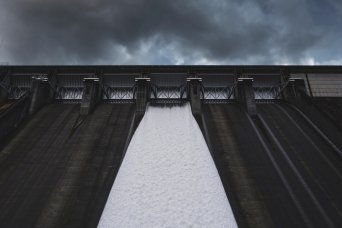- About
- Topics
- Story
- In-Depth
- Picks
- Opinion
- News
- Donate
- Signup for our newsletterOur Editors' Best Picks.Send
Read, Debate: Engage.
| topic: | Climate action |
|---|---|
| located: | Bosnia and Herzegovina |
| editor: | Katarina Panić |
Sara Tuševljak and Sunčica Kovačević are 25-years-old law students from Bosnia and Herzegovina who for several years have been fighting against small hydropower plants (HPPs) on the Kasindolska river, near the Bosnian capital, Sarajevo. Belgian-based company Green Invest and its local subsidiary operate one small HPP on this tiny river and plan to build two more, despite not having all the necessary permits. The company filed three defamation lawsuits and threatened two more against the young activists who have publicly criticised the uncontrolled deforestation and soil erosion that have appeared following the construction of the plants.
“Unfortunately, renewable energy sources increasingly become spaces for corruption, and therefore, there are attempts to exclude the citizens from decision-making processes,” Sunčica Kovačević told local media.
140 organisations and groups, both local and international, addressed the diplomatic representatives of Belgium and the EU Delegation in Bosnia and Herzegovina to voice their vital concern over the activities of the Belgian-based company.
“These baseless lawsuits have all the characteristics of Strategic Lawsuits Against Public Participation [SLAPPs], which are increasingly used in the region by politicians and big businesses to intimidate activists and silence critical voices,” the open letter by the organisatons reads.
The company turned a deaf ear on calls to drop the lawsuits, and court hearings that started this Monday will continue in December. Activists welcomed the court’s decision to allow a few environmental NGOs to receive the status of intervener.
Last week, the European Centre for Press and Media Freedom, ECPMF organised the first European Anti-SLAPP Conference in Strasbourg. The Coalition Against SLAPPs in Europe (CASE) calls on governments to take immediate legislative and practical actions to protect journalists and other public watchdogs from the growing threat of SLAPPs, which silence critical speech, shut down accountability, and undermine democratic rights.
They asked all governments to review relevant domestic laws, policies, and practices with particular attention to SLAPPs and adopt comprehensive anti-SLAPP legislation that provides for early dismissal, minimises the harm caused to SLAPP victims, and imposes dissuasive sanctions against those who use SLAPPs. Additionally, the governments should adopt a holistic approach for tackling SLAPPs, including awareness-raising and legal training, support mechanisms and free legal aid in SLAPP cases, a review of ethical codes regulating lawyers, data collection and reporting.
Photo by Dan Meyers

